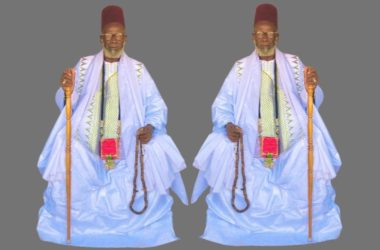 (JollofNews) – Hadhrat Abdullah bin Umar (Radhiyallaho anho) narrates that he heard the Prophet (Sallallaho alaihe wasallam) saying: “Islam is founded on five pillars: bearing witness that there is no god but Allah, and Muhammad (SAW) is His servant and apostle; establishment of salaat; paying of Zakaat; performance of Hajj; and fasting in Ramadhaan.”
(JollofNews) – Hadhrat Abdullah bin Umar (Radhiyallaho anho) narrates that he heard the Prophet (Sallallaho alaihe wasallam) saying: “Islam is founded on five pillars: bearing witness that there is no god but Allah, and Muhammad (SAW) is His servant and apostle; establishment of salaat; paying of Zakaat; performance of Hajj; and fasting in Ramadhaan.”
The Prophet (SAW) has compared Islam to a canopy resting on five supports. The Kali-mah is the central support and the other four pillars of Islam are, so to say, the remaining four supports, one at each corner of the canopy. Without the central support, the canopy cannot possibly stand, and if any one of the corner supports is missing a collapse will result in the defective corner. Now, let us judge for ourselves how far we have kept up the canopy of Islam. Is there really any pillar that is being held in its proper place?
The five pillars of Islam mentioned in this hadith signify the most essential duties of a Muslim. Although a Muslim cannot do without any one of them, yet salaat in Islam occupies a position next only to Imaan. Hadhrat Abdullah bin Mas’ood (RA) says:
“Once, I inquired of the Holy Prophet (SAW), which act (of man) was the dearest to Allah. The Prophet replied, ‘salaat’. I then inquired which act came next (in order of merit) and the Prophet replied, ‘Kindness to parents’. I again asked what was next and he answered ‘Jihaad’.”
Mulla Ali Qari (Rahmatullah alaih) has quoted this Hadith in support of the belief that salaat is the most important religious duty after Imaan. This is further corroborated by a hadith, in which the Holy Prophet (Sallallaho alaihe wasallam) is reported to have said: “Salaat is the best of all that has been ordained by Allah.”
“Hadhrat Abu Zar (RA) narrates that once the Holy Prophet (SAW) came out of his house. It was autumn and the leaves were falling off the trees. He caught hold of a branch of a tree and its leaves began to drop in large number.
At this he remarked, ‘O, Abu Zar! (RA) when a Muslim offers his salaat to please Allah, his sins are shed away from him just as these leaves are falling off this tree.”
In autumn, usually, the leaves of the trees fall in large numbers, so much so that on some trees not a single leaf is left behind. The same is the effect of salaat performed with sincerity and devotion. All the sins of the person offering salaat are wiped off.
It should, however, be remembered that according to the verdict of the theologians, it is only the saghaa’ir (minor sins) that are forgiven by the performance of salaat and other services.
The kabaa’ir (major sins) are not pardoned without repentance. We should, therefore, in addition to saying salaat, be particular about doing taubah (repentance) and istighfaar (seeking forgiveness). Allah may, however, pardon, by His bountiful Grace, even the kabaa’ir of any person because of his salaat.
Hadhrat Abu Uthman (RA) says: “I was once sitting under a tree with Hadhrat Salmaan (Radhiyallaho anho). He caught hold of a dry branch of the tree and shook it till all its leaves fell off. He then said to me, “0, Abu Uthman! (RA) Will you not ask me why I am doing this?” “Do tell me,” I entreated. He said, “The Apostle of Allah had done exactly like this before me, while I was with him under a tree.
He caught a dry branch of it and shook it, till all its leaves fell off”. At this he said: ‘O, Salmaan! (RA) will you not ask me why I am doing this?’ I replied: ‘Do tell me why you are doing this?’ He remarked: “Verily when a Muslim takes wudhu properly and then observes his salaat five times a day, his sins fall off just as these leaves have fallen off. He then recited the following verse of the Holy Qur’an:
“Establish salaat at the two ends of the day, and at the approaches of the night. Verily, good deeds annul ill deeds. This is a reminder for the mindful. (XI: 114)”
The behaviour of Hadhrat Salmaan (RA) in the above hadith displays the profound love which the Sahaabah had for the Prophet (SAW). They would often cherish the sweet memories of the time when the Prophet (SAW) was living among them. They would, while quoting him, enact exactly what they had seen him doing at a particular moment.
It is really very difficult to cover all the traditions of the Holy Prophet (SAW), which deal with the importance of salaat and which declare forgiveness for those who guard it. As had already been said before, the theologians restrict this declaration of forgiveness to saghaa’ir (minor sins) only, but in the text of the hadith there is no such restriction.
My learned father gave me two reasons for this. Firstly, it does not really become a Muslim to commit any of the kabaa’ir (major sins). If perchance any such sins are committed by him, he cannot rest in peace (due to inherent fear of Allah in him) until he washes them with his tears of repentance in crying before Allah. Secondly, the person who performs his salaat with sincerity and thoroughness is very likely to do istighfaar quite a number of times daily. Look for instance at the closing prayer of salaat itself, viz:
“O, My Lord! I have wronged my soul a great wrong, and none forgiveth sins save Thou alone. Then forgive me and have mercy on me. Verily, Thou art the Forgiving, the Merciful.
In the above hadith, mention is made of wudhu to be done properly. We should, therefore, be sure of the regulations about wudhu and try to observe all of these. For example, take the case of miswaak. It is sunnat of wudhu, but is very often neglected. It is said in a Hadith that the salaat offered after doing miswaak is seventy times superior to the salaat without miswaak. In another Hadith, use of miswaak has been enjoined very strongly, and the following benefits are attributed to it:—
“It cleanses and sweetens the mouth and checks its bad smell.”
“It is a cause of Allah’s pleasure and a blow to the Devil.”
“Allah and his angels love the person doing miswaak.” “It strengthens the gums and improves eye-sight.”
“It is a purge against bile and phlegm.”
To crown all, “It is a sunnah i.e. the practice of our beloved Prophet (SAW).”
As many as seventy virtues of the miswaak have been enumerated by the theologians. It is said that a person in the habit of miswaak dies with the Kalimah on his lips. The rewards of taking wudhu properly are very many. It is mentioned in ahaadith that the parts of body washed in wudhu shall glitter on the Day of Judgment and, by this (distinction), the Prophet (SAW) will at once recognise his followers.





